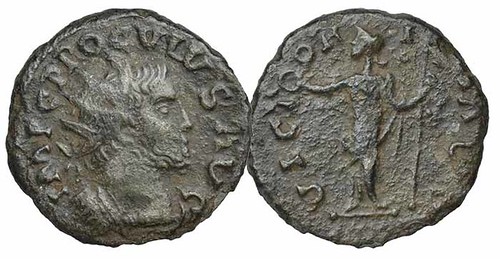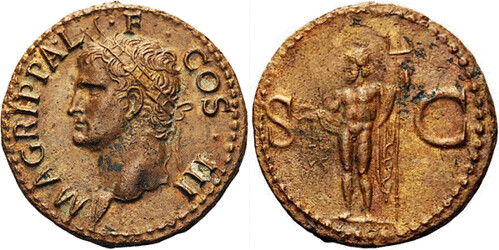
PREV ARTICLE
NEXT ARTICLE
FULL ISSUE
PREV FULL ISSUE
HELP SAVE ROMAN IMPERIAL COIN COLLECTINGMark Fox passed along this bulletin from Classical Numismatics Group about a new threat to the ancient coin collecting hobby in the U.S. This is an urgent matter with a comment deadline of July 8, 2020. -Editor 
Once again, our hobby is being threatened by potential new restrictions on the import of ancient coins. This time, two of most popular of all ancient types, Roman Republican and Roman Imperial coins, are in the cross-hairs. It is reportedly being proposed that import restrictions on all Roman coins be added to the current Memorandum of Understanding (MOU) between the United States and Italy as it comes up for renewal this year. To protect the pursuit we all love, Classical Numismatic Group is asking our collector friends and colleagues to send comments to the US State Department opposing any restrictions on the importation of Greek and Roman coins that were produced in Italy. The deadline for comments is July 8. In the past few years, collectors have gained some important exemptions for certain coin types via lobbying the State Department’s Cultural Property Advisory Committee (CPAC). While the record is mixed and some restrictions have been imposed, until now both later Roman Republican issues (after 211 BC) and Roman Imperial coins have not been subject to restrictions. This government regulation or MOU is up for renewal every five years. Since 2011 when this restriction first applied to ancient coins, it has covered Greek coins produced in Italy as well as the earliest Roman coins, pre-211 BC. This time, certain segments of American archaeological associations and a powerful lobbying organization that seeks to ban all private collecting of ancient artifacts will likely push for the extension of restrictions to all Roman coins. This would greatly reduce the number of coins that could enter and make importation from overseas venues either illegal or vastly more difficult and time consuming. This, along with the additional costs of importation to include required documentation, would likely lead to increased prices. While many of the most expensive coins do have pedigrees, there are many coins entering the market that do not have an extensive paper trail. While we have learned to live with restrictions on certain types of ancient coins by researching pedigrees, this has curtailed the trade among these types and resulted in increased prices that have limited the collector base and the general enjoyment of an age-old hobby. Comments should be polite, succinct and to-the-point. They should request that the current restriction on coins produced in Italy be removed, as coins by their nature are intended to circulate widely, in many cases far beyond the borders of Italy or even the Roman Empire. The current nation-state of Italy did not exist until 1861, therefor Italy should have no claim on coins produced thousands of years in the past. It is important to stress that, even if the current restrictions remain, under no conditions should they be extended to all Roman coins. For further information including suggested comments, see Please Help Save Roman Imperial Coin Collecting by Peter Tompa, a cultural property attorney who has made it his life’s work to stand against arbitrary import restrictions. Comments may be submitted to the Cultural Property Advisory Committee. Please click the blue button at the top right to be directed to the comment page. Please note that your comments are not private and may be included on the government public comment page. The deadline to submit a comment is July 8. Click here to submit a comment . Thank you for your attention to this important matter! Please feel free to contact CNG with any questions. To more information, read Peter Tompa's post: Please Help Save Roman Imperial Coin Collecting 
Mark adds: "And here I thought the proposed MoU between Turkey and the US was pretty disheartening. This one, if the rumors are correct and the new restrictions are approved, would effectively mean every ancient coin struck in the Western world could conceivably be stopped by US customs and/or subject to confiscation since it would be too confusing anymore to decide which types are restricted and which aren't, without proper documentation." In her July 4, 2020 email newsletter, Shanna Schmidt also discussed the urgency of fighting this MOU. -Editor Memorandum of Understanding with Italy (renewal and addition) Most collectors are aware that the U.S. holds agreements called Memorandum of Understanding (or MOUs) with several countries. These agreements were put in place to protect cultural property and ultimately stop looting of archaeological sites. Of course in theory this all sounds perfectly logical. Who of us wants to see looting of sites and destruction or a rise in black market sales of cultural property. The worst period was when the coin and antiquity industry was suggested to be linked to terrorism. The fact is that most of what is reported on site destruction and cultural property has very little to do with supporting terrorist organizations. The protection of cultural sites is very important to me, as is to other dealers in our trade. There is however a deep and unfortunate disagreement on what defines cultural property. Should ubiquitous coins of which hundreds of thousands exist be placed under the same protection as say a rare Greek vase? Do countries like the U.K. have it right with programs like the Treasure Act and the Portable Antiquities Scheme where metal detectorists are not vilified but actually help contribute to the recording of hoards? There are a lot of different viewpoints and I am not here to judge either side. Obviously as a dealer of rare coins I would like to see fairer agreements and some degree of open trade. I would like to see hoards recorded as they were in the past before people got scared and just absconded with material through the black market. The U.S. started it’s agreement with Italy in 2001 but it was without the inclusion of coins. This came much later in 2011 and included Greek, early Republican and provincial imperial coinage. The MOU is set to renew this month and the intention is now to add Roman Imperial coinage into the agreement. This would create even more restrictions on U.S. collectors, something that is not extended to many European countries. It is imperative that people voice their opposition to this extension of the MOU and the addition of Roman Imperial coins. Here is a link to cultural property attorney Peter Tompa’s blog and the link to the State Department website where you can send your note. Please consider doing this if you care about collecting. 
To more information, read Peter Tompa's post: Please Help Save Roman Imperial Coin Collecting 
Wayne Homren, Editor The Numismatic Bibliomania Society is a non-profit organization promoting numismatic literature. See our web site at coinbooks.org. To submit items for publication in The E-Sylum, write to the Editor at this address: whomren@gmail.com To subscribe go to: https://my.binhost.com/lists/listinfo/esylum All Rights Reserved. NBS Home Page Contact the NBS webmaster 
|